Staff report
The Trust recognises that providing high quality services requires an appropriately skilled and motivated workforce.
Workforce analysis
As of the 31 March 2022, the Trust employed a total of 2,428 (excluding bank staff) (up from 2,308 in 2020/21).
Of this 1,942 (1,845 in 2020/21) were female and 486 (463 in 2020/21) were male. The gender profile of these staff is:
- Directors, including non-executive directors:
- 6 female (5 in 2020/21)
- 5 male (6 in 2020/21).
- Senior managers:
- 56 females (47 in 2020/21)
- 24 male (23 in 2020/21).
- All employees (including bank staff) 2,847 (2,657 in 2020/21):
- 2,289 females (2,133 in 2020/21)
- 558 males (524 in 2020/21).
The following table shows an analysis of average staff numbers split by occupational code. The average number of employees is calculated as the whole-time equivalent number of employees under contract of service in each week in the financial year, divided by the number of weeks in the financial year.
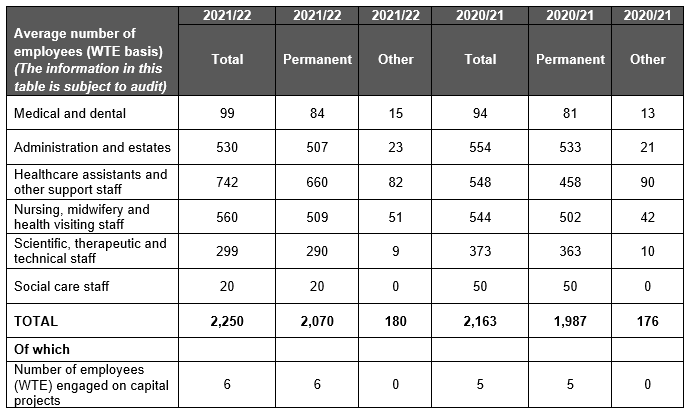
Turnover
Information on staff turnover can be viewed by visiting the NHS workforce statistics published by NHS Digital on their website at www.digital.nhs.uk
Staff costs
Staffing takes up around 80 per cent of the Trust’s expenditure. Subject to audit, in the last 12 months this is shown in the table below:
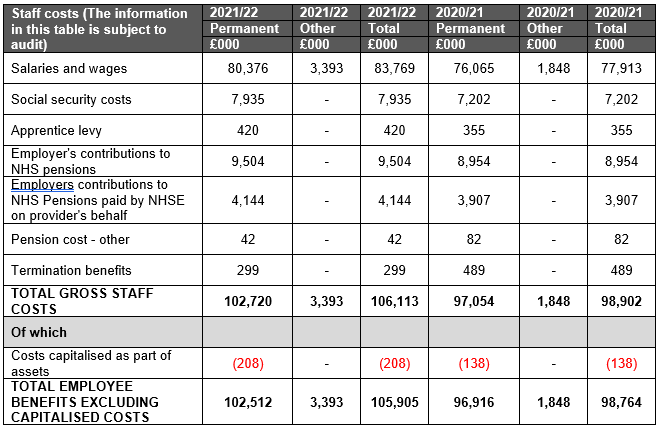
Health and wellbeing
Staff sickness absence data
The table below shows data relating to:
- total days lost
- total staff
- average working days lost
for 2019/20, 2020/21 and 2021/22

Referrals to Staff Wellbeing Service
The table below shows data relating to the number of referrals to the Staff Wellbeing Service for 2020/21 and 2021/22

Unsurprisingly 2021-22 has continued to be dominated by COVID-19 and the service has begun to see the impact of this on healthcare staff, in relation to their emotional and physical wellbeing, leading to increased activity for the Staff Wellbeing Service.
The Staff Wellbeing Service (SWS) has continued to support LPFT staff and all staff across Lincolnshire Integrated Care System. The service has continued to develop the function of the Staff Wellbeing Hub, which is now fully integrated into the Trust’s staff wellbeing service and has become the central point for referrals, queries and support for staff both inside LPFT and within the wider health and care system.
The service has continued to receive funding from NHS England and Improvement to support the development and function of the Mental Health and Resilience Hub- known locally just as Staff Wellbeing Hub. This funding has also now been committed for another year allowing service provision to continue into 2022-23. There has been investment into the service with additional clinical staff to support the role of the Hub. These staff have been supported in their secondment to the Hub by steps2change.
The model for the Hub has continued to develop, reflecting both the local demand on service and also the wider learning and research from our national colleagues in terms of developing issues and presenting conditions along with other factors.
The Hub continue to operate a telephone and email helpline during Monday to Friday 9am to 5pm as the demand for out of traditional working hours is no longer present. However, this is reviewed regularly and may be subject to change depending on need.
The helpline continues to offer immediate initial assessment of need and time to talk. Then, as appropriate, a brief intervention takes place around:
- supporting their wellbeing,
- guided self-help resources
- referral into more appropriate services for their need,
including:
- assessment in the staff wellbeing core service
- LPFT crisis team referral
- assessment by psychiatrist
- assessment followed by treatment by steps2change for non-LPFT staff.
LPFT Steps2change continue to offer a direct referral route into their service for health and social staff in Lincolnshire. This continues to be a preferred route for many people who wish to access services completely separate to their organisation. During 2021-2022, 1,059 people made a referral into steps2change, identifying themselves as health and social care staff and were offered a fast track assessment of need and access to treatment where possible.
There have been 401 referrals into the service and who received an assessment of need and 710 contacts via the Hub during the period.
Everyone contacting the Hub for wellbeing support are offered an assessment of need. The average wait time for the assessment is 10 days. Many people receive and assessment within the first few days after contacting the Hub. Reasons for assessment taking place after 14 days is usually due to the person’s availability.
The table below shows:
- categories of the days taken between contact the Hub and getting assessed
- percentage of all referrals received for each of the categories.

Work support pathway
Alongside the development of the Hub and maintaining a therapy provision to LPFT the service has been developing a Work Support Pathway. This aims to support staff who are at risk of becoming absent from work or who are absent from work with a fast-track assessment of need within three working days of referral. This assessment is carried out by an Occupational Therapist who has specialist skills in providing practical support to facilitate and maintain health, wellbeing and recovery and to support our staff to overcome barriers which may be preventing them maintaining work.
Since the start of this pathway we have supported 104 staff and their managers, where appropriate, with advice, workplace adjustments and specific occupation based therapy to support the person to maintain work or return to work.
In addition to assessment, therapy and workshops for staff, the service also offers support to LPFT teams who have experienced a critical incident, including loss of a service user or colleague. This offers support alongside the support offered by their manager and colleagues to hold a reflective space for all affected.
The funding from NHSE/I has also afforded the opportunity for the Hub to take on its own clinical system. With the support of the Trust’s Clinical Systems team there has been the introduction and development of a discreet and independent clinical system enabling the service to utilise patient electronic records and to begin to see the reporting benefits of a purpose designed system.
Along with the additional funding from NHSE/I there has been the requirement to develop the reporting requirement and from March 2022 the service will be required to report to NHS digital. Access to the clinical system enables this requirement and although the reporting requirement is not mandated until March 2022, the service has been able to meet the reporting requirement to NHS Digital for the service from October 2021 when it was initially indicated.
Musculoskeletal care
Fast track access to physiotherapy for musculoskeletal issues is provided as part of the wider package of benefits offered to LPFT staff from the Staff Wellbeing Service.
Referral rates for this service have increased over this period, with staff identifying home working and increased time on technology being the main factors impacting on their musculoskeletal health.
The table below shows musculoskeletal referral rates for the three years:
- 2019/20
- 2021/21
- 2021/22

During 2020, access to both physiotherapy services and our inhouse physiotherapy service were not available due to COVID-19 restrictions and redeployment of the inhouse physiotherapy time to support clinical areas. The cost to LPFT for the service provided by external physiotherapy companies will be around £20,000 this year. Exact figures will depend on whether all people take up their full allocation of 6 sessions.
Eye vouchers and cycle to work scheme
As part of the health and wellbeing offer to LPFT staff, the Staff Wellbeing Service manages requests for eye care vouchers and cycle to work scheme applications.
There has been an increase in requests for these over the last year. Data for last year is given as a comparison.

Lincolnshire System working and partnerships
In addition to this the Trust has been very active in supporting the health and wellbeing agenda across the Lincolnshire health and care system:
- Development of workshops to support system staff e.g., Burn out workshop and Boost your wellbeing.
- Support to individual teams across the system in relation to wellbeing.
- Supporting the system to access specifically designed applications to support general wellbeing.
- Supporting staff access to COVID-19 vaccinations, as well as supporting staffing at the vaccination centres themselves.
- Producing and updating the wellbeing resources available to support the system offer.
- Active engagement with Health and Wellbeing Programme Board.
- Continuing to provide additional support to United Lincolnshire Hospitals NHS Trust’s health and wellbeing staff, including weekly meetings to escalate fast tracks, provide clinical advice and link in with best practice across the Midlands.
Our staff, policies and actions
People Strategy
The Trust’s strategic priority for people is to be an outstanding employer.
An updated People Strategy was approved at Board in January 2021. Review of the strategy and assurance on progress of implementation takes place through the People Committee to the Board of Directors via the minutes and tracks the employee life cycle of:
- Finding and recruiting staff - more people, through attraction, grow your own and retention.
- Valuing staff - compassionate and inclusive leadership, leading to a sense of belonging.
- Developing staff and new roles - equipping staff for current and future workforce requirements
- Retaining staff - flexible and predictable working, recruitment and retention initiatives, understanding why people leave.
Support for employees with a disability
The Trust believe that people and the organisation work best when equality and diversity are truly valued and promoted within the Trust’s culture and leadership, aiming to develop and ensure equality is mainstreamed into everything we do.
The Trust have in place a robust Recruitment Policy which is underpinned by the Trust’s Mission, Vision and Values and the provisions outlined in the Equality Act 2010, to eliminate discrimination and promote equality of opportunity.
Values based recruitment approaches ensure that the future and current workforce is selected against the Trust’s values and behaviour framework as well as the NHS Constitution.
Training is provided to managers who are responsible for recruitment to ensure they are aware of the responsibilities at each stage of the recruitment process from attraction through selection.
In addition to this, The Trust is a Level 2 Disability Confident Employer, which means;
- Actively attracting and recruiting disabled people to help fill opportunities (including jobs, apprenticeships, internships, work experience, etc.).
- Providing a fully inclusive and accessible recruitment process.
- Offering an interview to disabled people who meet the minimum criteria for the job.
- Being flexible when assessing people so disabled job applicants have the best opportunity to demonstrate that they can do the job.
- Proactively offering and making reasonable adjustments as required.
- Encouraging our suppliers and partner firms to be Disability Confident.
- Ensuring employees have sufficient disability equality awareness training.
These policies apply to people with a disability wanting to work for the Trust as well as staff who become disabled during the course of their employment.
The Trust also actively promotes and supports the employment of people who use our services in order to better reflect the diversity of our patients/clients. As a matter of good practice, we have service user representation within our selection processes.
Employee information, consultation and engagement
The Trust value of collaboration, listening to each other and working together is at the heart of our commitment to work with staff and unions to deliver improvements for the benefit of employees and patients, enhance engagement, manage change, promote health and safety, deliver training and management development and develop policies and best practice.
This means that staff are consulted on any formal employment changes in accordance with our organisational change policy. This involves engaging with affected staff at the earliest possible stage, increasing engagement throughout the process. The Trust work in partnership with Staff Side to support improvements and efficiencies across the organisation whilst ensuring that the quality of provision, the efficacy of service and the standards of care are not compromised.
There are various established communication channels operating regularly throughout the Trust, aimed at keeping all staff up to date with news and developments. These include:
- Better Together - members’ magazine provides an update on service developments and the activities of governors, staff and volunteers.
- Staff intranet - updated daily to share news and information with all staff.
- Weekly Word - weekly electronic bulletin sent to all staff promoting that week’s top news and forthcoming activities. This includes a summary of key messages from the executive team.
- Annual Nursing conference - respected clinicians from across the country are invited to share their views on the latest developments in mental health and learning disability care with Trust staff.
- Video blogs - filmed messages from the Executive Team on specific issues. These are posted on the staff intranet and closed Facebook group.
- Inspirational Leadership Programme - development events held quarterly and involve a briefing from the Chief Executive and Chair.
- Staff Closed Facebook Page - a closed group enabling rapid consultation with and feedback from staff.
- Team Brief - monthly meeting chaired by a member of the Executive team and attended by senior managers to cascade key messages and share Divisional updates.
There is a programme of corporate and local induction for all new employees, to ensure all staff are sufficiently trained to national NHS requirements. The corporate induction has returned to being delivered in person from April 2022. This programme is mandatory and includes elements to enable all staff to perform their role at a basic level. This may then be supplemented with additional training according to specific service need.
Staff benefits
The Trust employ caring, compassionate, and committed staff who always strive to deliver better patient care. In return, the Trust offer the following benefits in addition to the national Terms and Conditions of Service:
- Staff Wellbeing Service offers a range of health and wellbeing benefits, including access to physiotherapy, exercise classes and one to one psychological support (counselling, psychology, occupational therapy).
- Flexible working arrangements and leave provision to support employees through their careers, this includes part time working, job share working, flexi time hours, compressed working hours, and remote working amongst others.
- The car lease scheme is available to all staff through either salary sacrifice or salary deduction.
- The Home Electronics and White Good Scheme is a salary sacrifice scheme that gives employees access to more than 5,000 products including the latest desktop computers, laptops and domestic appliances.
- Our Cycle to Work Scheme enables staff to access bikes for cycling to work through a salary sacrifice scheme.
- Through Wagesteam, we offer early access to wages ahead of monthly pay day and salary deducted saving options.
The Trust are committed to ensure our benefits package meets the needs of our employees and provides a range of benefits for all staff, regularly reviewing our offer.
Staff recognition
In addition, to national NHS pay terms and conditions, the Trust recognises and celebrates staff who demonstrate its values through a number of different recognition and reward initiatives that enable managers, colleagues and service users and carers to say “thank you”.
These are:
- Staff Excellence Awards - The Staff Excellence Awards took place virtually in 2021 due to the pandemic. The awards are an opportunity to celebrate the achievements of staff, volunteers and teams across 11 categories. In 2022, we will be returning to hosting a face-to-face event.
- Long Service Awards - a monetary award and certificate is presented to employees with 20, 30 and 40 years NHS service to acknowledge their commitment to the NHS.
- Discretionary staff rewards (LPFT hero awards) - managed at a local level to acknowledge individual pieces of work. Staff and teams receive small gifts for their work through an electronic nomination process and are considered as part of the Trust’s quarterly LPFT Heroes going forward for shortlisting at the next annual award ceremony.
- Formal ‘Thank you’ - The Trust has produced thank you cards for staff and managers to send to each other in recognition of positive pieces of work.
Staff experience and engagement
The Trust has now embedded a formal staff engagement process aligned to the national NHS staff survey. This incorporates both the annual staff survey and the national quarterly pulse survey that was launched in July 2021, replacing the friends and family test.
Division specific engagement events have been scheduled following the release of the staff survey results to share the outcomes and understand the response to these results as well as what staff feel the Trust does well as what could be better. This will then formulate a ‘together we did’ approach to identify the Trusts response to the feedback that was received.
NHS Staff Survey
The NHS staff survey is conducted annually. From 2021/22 the survey questions align to the seven elements of the NHS ‘People Promise’ and retains the two previous themes of engagement and morale. These replace the ten indicator themes used in previous years. All indicators are based on a score out of 10 for specific questions with the indicator score being the average of those.
The response rate to the 2021/22 survey among Trust staff was 64% (2020/21 the responses rate was 61%). Scores for each indicator together with that of the survey national benchmarking are presented in the table below:
2021/22 survey results
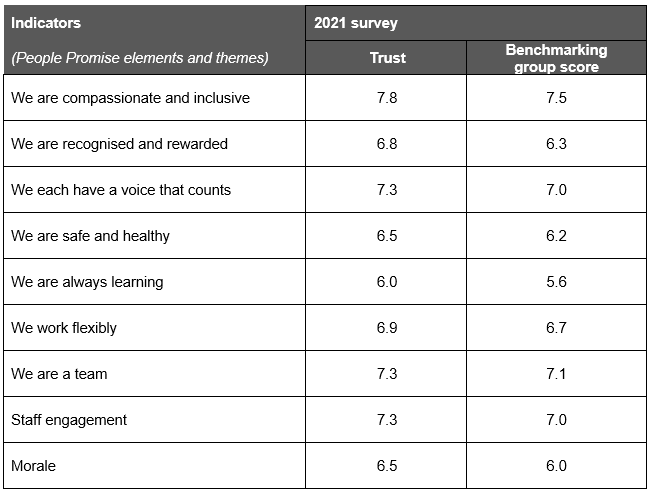
2019/20 and 2020/21
Scores for each indicator together with that of the survey benchmarking group mental health and learning disability trusts are presented below.
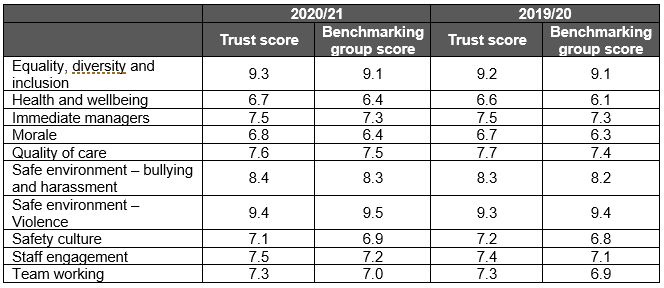
In comparison to our previous year’s results, we remained the same in the majority of areas (49 areas) with three areas being significantly better and four significantly worse; and when compared to other mental health and learning disability organisations we were significantly better in 67 areas and the same in 25, with no areas being significantly worse.
We are proud of the areas we have performed well in and this is testament to the work achieved within the organisation and across the people team; of particular note is the increase in the health and wellbeing score that has risen by 26% in the last 12 months.
The areas where scores have significantly declined from last year, centre around vacancies. This impacts on “feeling pressure to attend work when not well”, enthusiasm and working additional paid hours. However, additional consideration must be given that many of our substantiative staff also have additional bank contracts. Bank use is the Trust’s model for filling staff shortages, reducing any need to use agency staff. Many of our staff choose to work additional paid hours on these bank contracts. However, if the Trust’s vacancy gap were to be reduced there would be less need for the Trust to utilise additional bank staff.
Physical violence is also an area of focus in terms of numbers and reporting and finally staff not feeling involved in making suggestions for improvements. Given these factors it will be of no surprise that the teams reporting the most difficulties in these areas were our adult inpatient division.
We have also themed our qualitative (free text) data to align to the 7 national People Promise areas. Again, these themes echo much of what the qualitative data tells us and highlights the number one issue of staff turnover and retention. In addition to this, several sub themes emerged; relating to variation in leadership styles, and some descriptions of bullying to describe some management approaches.
Another subtheme from the qualitative data has emerged around training and whilst proportionately numbers are low, it is nevertheless an area worthy of consideration. The final subtheme emerging was around pay and fixed term contracts causing some uncertainty and discontentment for some staff.
Following national benchmarking data of all Provider Trusts in England (217 organisations) Lincolnshire Partnership NHS Foundation Trust (LPFT):
- Scored highest (1st) for staff morale
- Scored 2nd for recognition and reward – we are recognised and rewarded
- Scored 2nd for safe and healthy - we are safe and healthy
- Scored 3rd for being listened to - we each have a voice that counts
- Scored 3rd for in feeling part of a team – we are a team
And amongst all Mental Health and Learning Disability Trusts (51 organisations) LPFT:
- Scored 5th in Overall Engagement Score, staff feeling able to contribute to improving their experience at work
And regionally:
- Scored highest (1st) on the Compassionate and Inclusive indicator, with a score of 7.8 which was highest score in Midlands
Futire priorities and targets
The organisation is launching a targeted piece of work around retention, to understand what matters to staff at work, what keeps them working for LPFT and what tempts them to stay. The Walking in Your Shoes initiative will include staff engagement events, suggestion boxes across all sites and use of internal staff social media platforms to understand the views of staff and consider the Trust response to this.
The Organisational Development team has met with the four clinical divisions, corporate areas and medical management team. The detailed results for each team have been shared. Any concerns regarding team and line management styles are being picked up and action plans are being developed with a range of interventions being offered.
A task and finish group to look at both mandatory training and clinical training requirements based on current and new models of care has been developed.
Trade Union facility time
In accordance with the Trade Union (Facility Time Publication Requirements) Regulations 2017 and the facility time in accordance with Schedule 2 was as follows:
The table below shows the total number of your employees who were relevant union officials during the relevant period:

The table below shows the percentage of time spent on facility time:

The table below shows the percentage of pay bill spent on facility time:
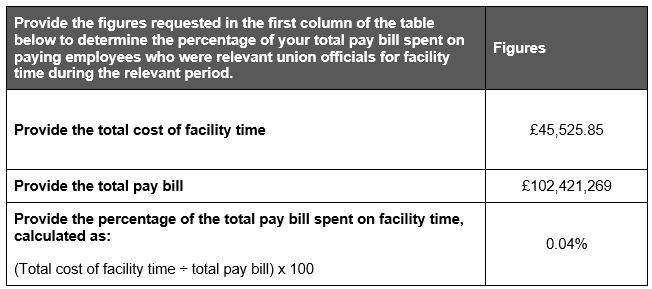
Paid trade union activities
As a percentage of total paid facility time hours the table below shows how many hours were spent by employees who were relevant union officials during the relevant period on paid trade union activities.

Expenditure on consultancy
During the year, the Trust spent £118,650.65 on consultancy (2020/21 the figure was £229,000).
Off-payroll arrangements
The Trust occasionally uses off-payroll arrangements to obtain services where normal search and selection processes are unable to find suitable and immediately available candidates. Such arrangements are carefully considered and reviewed before engagement. Before such off-payroll arrangements are started, checks are made in accordance with government guidance, to provide assurance to the Trust that individuals or companies providing such services are compliant with tax legislation. All off-payroll payments are reported to and monitored by the Audit Committee.
‘Highly paid’ is defined as the threshold used by HM Treasury in the tables below.
The table below shows the length of all highly paid off-payroll engagements:
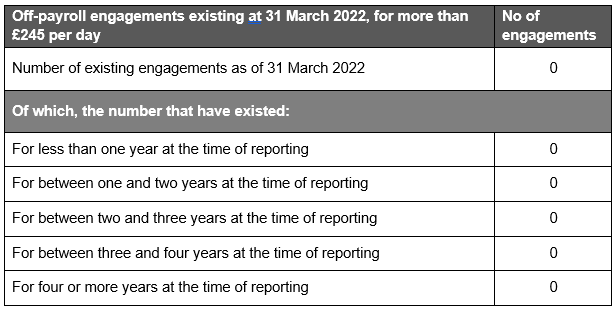
The table below shows off-payroll workers engaged at any point during the financial year:
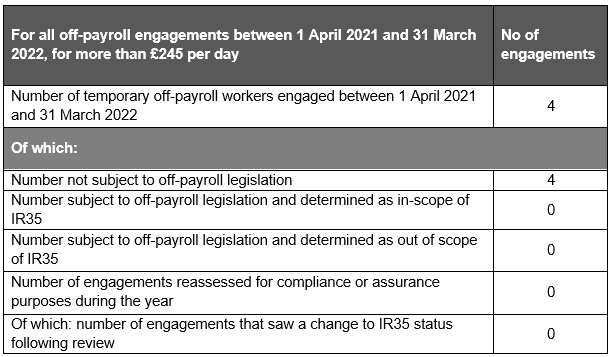
There were no cases where the Trust has engaged without including contractual clauses allowing the Trust to seek assurance as to their tax obligations. There were no cases where assurance had not been obtained.
The table below shows off-payroll board members and senior official engagements:
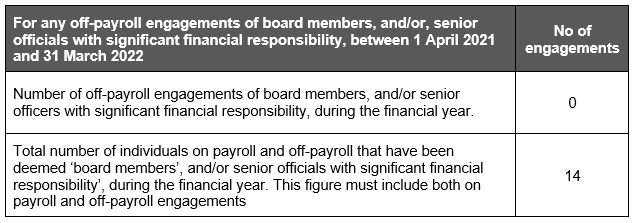
Details of service contracts for each director who served during the year are detailed in the Accountability Report
Exit packages
The table below, which remains subject to audit, summarises the total number of exit packages agreed during 2021/22, with 2020/21 information included in brackets for comparison.
Included within these are compulsory redundancies arising through the Trust’s operational efficiencies and other exit packages paid.
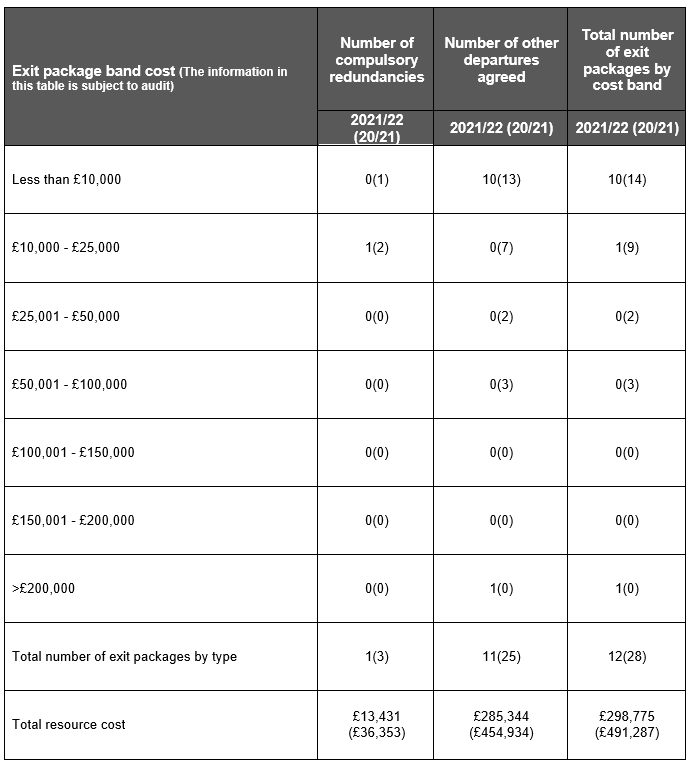
Exit package information for executive directors is now included within this note.
Supporting notes
- Redundancy and other departure costs have been paid in accordance with the provisions of the NHS Agenda for Change and Medical and Dental Terms and Conditions.
- Exit costs in this note are the full costs of departures agreed in the year. Where the Trust has agreed early retirements, the additional costs are met by the Trust and not by the NHS Pensions Scheme.
- Ill-health retirement costs are met by the NHS Pensions Scheme and are not included in the table.
- This disclosure reports the number and value of exit packages agreed in the year.
- Note: the expense associated with these departures may have been recognised in part or in full in a previous period.
- Further information can be found in the Remuneration Report where applicable.
Exit packages: non-compulsory departure payments
Payments are disclosed in the following categories in the table below:
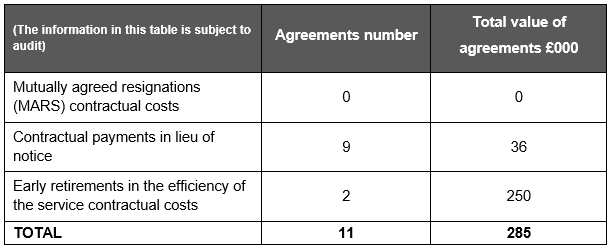
A single exit package can be made up of several components, each of which will be counted separately in this note; the total number in this table will not necessarily match the total numbers in the exit packages note above, which will be the number of individuals.
The Remuneration Report provides specific details where applicable of exit payments payable to individuals named in that report.
Annual Equality Report
Lincolnshire Partnership NHS Foundation Trust recognises the importance of ensuring its services are fair and equitable to all. The diversity of:
- staff
- service users
- partners
- visitors
to our services is celebrated.
We expect everyone who visits any of the sites, comes into contact with any Trust services, or works for the Trust to be able to participate fully and achieve their full potential in a safe and supportive environment. The organisation welcomes all service users and members of staff inclusive of:
- race
- disability
- sex
- sexual orientation
- gender reassignment
- marriage and civil partnership
- pregnancy and maternity
- age
- religion or belief.
The Trust meets all of its requirements from within the Public Sector Equality Duty (which forms part of the Equality Act 2010). The requirements and how these are met is detailed below:
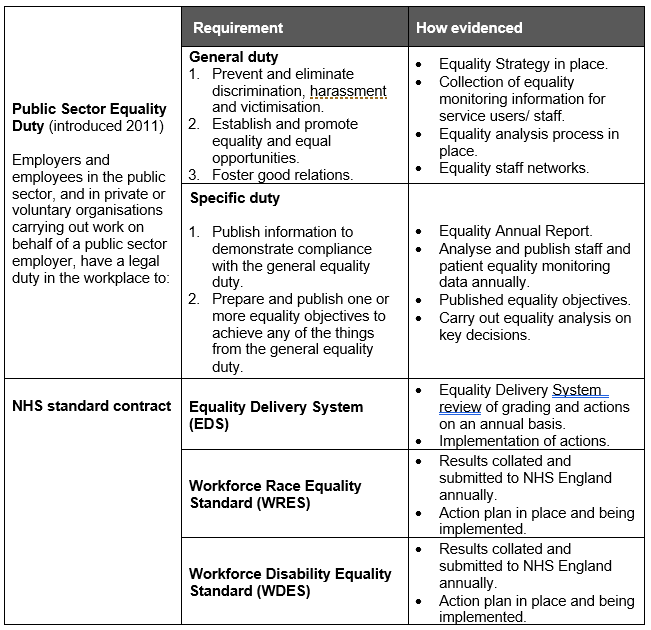
Interpretation and translation service
The Trust has a duty to provide a whole range of interpretation and translation services to patients and service users. The Trust has two providers for interpretation and translation services depending on requirements.
One provides the Trust with:
- Telephone interpretation
- Face to face interpretation
- Document translation
- On demand Video interpreting service
Another specialist provides the Trust with:
- Sensory impairments interpretation and translation e.g. British Sign Language/ Sign Supported English/ Braille/ audio/ text relay/ SMS.
Stonewall membership
The Trust is in its tenth year of being a Stonewall Diversity Champion. Stonewall is a leading national charity which stands for:
- lesbian
- gay
- bi
- trans
- queer
- questioning
- asexual
(LGBTQ+) people everywhere.
They imagine a world where all LGBTQ+ people are free to be themselves and we can live our lives to the full. Inclusive workplaces have a huge part to play in this making this world a reality. But inclusion is not a given. Ensuring that workplaces are truly inclusive without exception is an important step towards this vision.
The Trust have entered the Stonewall Workplace Equality Index (WEI) for the last 10 years, and in 2022 were awarded the Stonewall Gold award for commitment to LGBTQ+ inclusion at work.
As part of the Stonewall’s ‘Bring yourself to work’ campaign, highlighting the importance of inclusive work environments, this award recognises organisations for their commitment and efforts to becoming an LGBTQ+ employer.
In 2022 the Trust fell just outside the Top 100 in the Stonewall Workplace Equality Index benchmarking assessment, ranking 124th out of a record 400+ entries. The Stonewall rating is often seen as an indicator of an organisation’s approach to equality and inclusion overall and can further increase all diversity in the workplace.
Part of the Trust’s work for LGBTQ+ equality in 2021-22 has included hosting a successful series of webinars for staff during LGBTQ+ History Month in 2022. This is instead of the usual multi-agency conference, which was accessed by over 100 staff from within the NHS Lincolnshire system. New progress flag stickers were launched for Trust buildings along with the promotion of the NHS Rainbow badge programme and rainbow lanyards newly purchased by the Trust for staff. The Trust’s inpatient wards were also all supplied with activity packs and resources to be able to complete activities with our patients regarding LGBTQ+ inclusion.
Staff networks
The staff networks provide a platform for staff to voice their opinions and support the Trust to improve working practices and services. It has been a resource that has been invaluable and led to the development of a number of positive outcomes.
There are currently six active staff networks:
- MAPLE (mental and physical lived experience) and allies disability staff network.
- LGBT (lesbian, gay, bi and trans) and allies staff network.
- BAME (black, asian and minority ethnic) and allies staff network.
- Women’s and allies staff network
- Men’s and allies staff network
- DAISIES - Domestic Abuse: Improving support in every service- staff network
These networks are open to all staff who have an interest in supporting these areas. They do not have to identify with the area, just have a desire to champion within their own working area.
Meetings take place monthly and since COVID-19 have been held virtually which has increased their engagement and attendance.
To allow an opportunity for peer support a pre-meeting takes place for the first 30 minutes for those members who identify as a protected characteristic. This is followed by a break of 15 minutes and then the meeting with all members and guests takes place.
Each staff network has an executive sponsor, whereby an executive director has committed to championing that group at Board level. They attend at least one meeting a year to understand the issues being raised by the group.
Staff networks also have visible leaders. Visible leaders are people who identify with that equality area and are willing to champion that area and talk about their own experiences.
Equality and diversity training
In 2021/22 the Trust’s compliance rate for mandatory equality and diversity training was 91% (from 95% in 2020/21).
Training in equality and diversity is a mandatory e-learning module for all staff and a key component of the staff induction process. The training has a three-yearly refresher to ensure that all employees are equipped with the appropriate knowledge and awareness to provide consistently fair treatment towards colleagues and patients/service users alike.
In addition, team sessions are offered by the equality and diversity lead for services who would like further information and training around equality and diversity. This has particularly focused on the issue of equality monitoring data collection.
Longer term ambitions
The regional priorities from NHS England/ Improvement provide the Trust with 4 priorities for workforce equality, diversity and inclusion, which the Trust will be focussing on long term which are:
- Overhaul of recruitment processes
- Reducing the disciplinary gap
- Supporting and resources staff networks
- Using the Model Employer to support tackling race inequality
The primary aims of these actions are to:
- address unfair treatment experienced by staff from diverse background who may be disadvantaged in recruitment and promotion practices,
- embed accountability and make workforce diversity an organisational priority by tackling institutional racism and reducing bias, and
- increase diversity of talent pools, particularly those from diverse ethnic backgrounds.
From the Trust’s Equality Annual report 2021-2022, the following objectives were set for 2021-2022 These objectives have been worked on within 2021-2022 and are still ongoing.
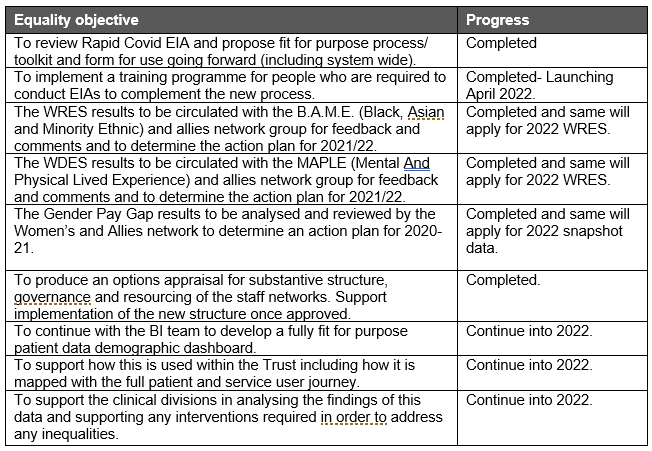
Modern Slavery Act 2015
In accordance with the Modern Slavery Act 2015, the Trust ensures that Modern Slavery for example, slavery and human trafficking, is not taking place in any part of its business or any of its supply chains. This is achieved through ensuring that services are procured through approved providers only or tendered through robust procurement processes.
Health and safety
The Trust continues to set the highest standards of health and safety through its Health and Safety Strategy for all staff in the workplace, members of the public, patients and service users and others who come into the organisation.
By signing the Health and Safety Executive (HSE) pledge in 2010, the Trust acknowledges its responsibilities under the NHS constitution towards health, wellbeing and safety of its staff, service users and the public.
The Trust has a management group, consisting of managers and staff side representatives from across the organisation, which facilitates health and safety implementation and planning. The group meets on a regular basis and provides the Board of Directors with reports on health and safety issues and performance during the year.
Health and safety forms part of the Trust’s mandatory annual e-learning training programme for all staff, with new staff also required to complete health and safety training during their induction.
It is a key priority of the Trust to ensure that health and safety is fully embedded into the operational management responsibilities for all services, supported by effective working relationships between operational staff, health and safety officers and estates functions.
During the reporting period, there were a total of seven incidents reported under the Reporting of Injuries, Diseases and Dangerous Occurrences Regulations 2013 (RIDDOR) to the HSE. These were all investigated internally and appropriate measures put in place to prevent incidents of a similar nature recurring. None of the incidents reported led to any further action being taken by the HSE.
Counter Fraud
Fraud is estimated to cost the NHS over a billion pounds a year that could have been spent on patient care, so everyone has a duty to help prevent it. NHS Fraud may be committed by staff, patients and suppliers of goods/services to the NHS.
The Trust is committed to deterring and detecting all instances of fraud, bribery and corruption as far as possible within the Trust and ensuring that losses are reduced to an absolute minimum. This ensures that valuable public resources are used for their intended purpose of delivering the best possible care and patient experience.
The NHS Counter Fraud Authority (NHSCFA) provides the national framework through which NHS Trusts seek to minimise losses through fraud. The Trust follows the guidance contained in the NHS Counter Fraud Functional Standard and ensures our contractual obligations with our local clinical commissioning group, and in due course the Lincolnshire ICB, are adhered to.
The Director of Finance and Information is nominated to lead counter fraud work and is supported by the Trust’s Local Counter Fraud Specialist (LCFS). The Trust also has a Counter Fraud Champion, the Freedom to Speak Up Guardian, who is nominated to the NHSCFA. The role of the Counter Fraud Champion is to strengthen counter fraud work by supporting the LCFS in the work they do.
We have a collaborative counter fraud arrangement with four other local NHS Trusts, which means we have a dedicated LCFS providing a shared service between ourselves and another local Trust. The LCFS is supported by a small team of counter fraud specialists dedicated to combatting fraud within both community and secondary care settings.
The Trust has a Counter Fraud, Bribery and Corruption and Code of Conduct Policy Handbook, which contains:
- the Trust’s Counter Fraud, Bribery and Corruption Policy and Response Plan
- Anti-Bribery Policy and Associated Guidance
- the Standards of Business Conduct Policy.
The handbook provides a framework for responding to suspicions of fraud and provides advice and information on various aspects of fraud investigations. The handbook also details staff requirements in relation to gifts, hospitality, conflicts of interest and outside employment.
An annual work plan, approved by the Director of Finance and Information, with oversight from the Trust’s Audit Committee, has been in place. The key aims are to seek to proactively create an anti-fraud culture, implement appropriate deterrents and preventative controls and ensure that allegations of fraud are appropriately and professionally investigated to a criminal standard. Progress reports on all aspects of counter fraud work and details of investigations are received at each meeting of the Trust’s Audit Committee.
In addition to continuing to raise awareness of fraud against the NHS throughout the year, in November 2021 we also held a Fraud Awareness Month. The Trust was an official supporter of International Fraud Awareness Week in the same month. Efforts were amplified as a result of intelligence received relating to emerging COVID-19 threats in the early part of 2020, and those efforts have continued throughout the last financial year. Fraud awareness work was substantially increased generally across the Trust, and also targeted at specific areas of heightened risk.
The Trust has a well publicised system in place for staff and patients to raise concerns if they identify or suspect fraud. They can do this via our LCFS, Director of Finance and Information, via the NHS fraud and corruption reporting line:
Telephone 0800 028 40 60
Website www.

